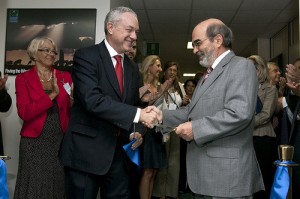Italy-FAO Expo aid to IPS puzzles donors

ROME – As IPS agency chief Mario Lubetkin prepares to head FAO’s byzantine communications division, Italy has pledged dlrs 250,000 to the UN agency to commission articles from IPS about Expo Milano 2015.
“A focused and clear UN message or theme is essential to achieving maximum impact at Expo 2015,” the formulator of the unusual project, Mattthew Keil, wrote in an FAOP project Review sheet. “In this respect, the project will shed light on the stories behind the current food crisis to understand local and global causes of shortages and rising prices, and their long term effects, and will aim to communicate the key themes of FAO and Rome-based agencies relative to Expo 2015.”
The expected results of the investment by the Italian taxpayer are “Ten reports (stories or op-ed columns) written in English or Spanish, selected translations into English, Spanish, Italian and other languages, selected photographs, publication of original and translated reports on the public websites of IPS news agency, dissemination to IPS global clients and users.”
Senor Lubetkin, a suave Uruguayan known for living a luxurious lifestyle who has headed low-paying Inter Press Service for a decade, signed a contract with FAO earlier this month to become a D2 level head of the UN agency’s communications division.
Recently FAO granted IPS extensive office facilities at FAO headquarters including use of a tv editing studio apparently donated to the UN agency by the United Arab Emirates.
There is no suggestion necessarily of a conflict of interests. FAO Director General José Graziano da Silva is said to have a close friend among other IPS staff. According to the project review “Expo 2015 is a great opportunity for the United Nations to enhance global discussion and promote contents and key messages about the Global Agenda 2015 and post-2015 Development Agenda.”
Nevertheless FAO watchers wonder whether for dlrs 20,000 an article the UN agency’s vast team of well-paid press officers could not write their own stories that would be just as likely to have media impact as the IPS scribes.
Included in the dlrs 250,000 budget is a payment of dlrs 26,645 to unnamed “international consultants” while a further 7,500 goes to “reporting and evaluation” and a further dlrs 16,355 to “direct operating costs,” leaving 199,500 for the “letters of Agreement.”
An internal review of the project by an FAO watchdog body resulted only in a suggestion that IPS should focus in its stories as much as possible on the “sexy” subject of edible insects, a theme that generated considerable interest in the Italian media in the past.
“In order to further improve the ‘attractiveness’ of the proposal to the Italian Donor, we recommend some changes … including our work on edible insects,” reviewer Paul Vantommewrote. “The work done on Edible insects is among the major Media hits of FAO and its number of hits is unequalled.”
Senior members of the Expo Milano 2015 team “are very much interested in seeing visibility of our work on Edible insects … as this will draw huge numbers of visitors to the Expo,” Mr Vantomme added.
Given that even dlrs 1000 for a journalistic feature article could be considered generous by normal journalistic standards on the open market, it remains to be seen why the Italian taxpayer is willing to pay 20 times as much for articles written by IPS, a ramshackle organization that has survived in the past due to the efforts of one or two dedicated editors such as Australian Mike Keats, former UPI vice president who worked hard to transform the IPS news room in the late 1990s well before it was moved to FAO headquarters.
Once Senor Lubetkin takes over as FAO communications chief in February when his notice to IPS concludes he will be able to monitor the progress of FAO press chief Enrique Yeves in commissioning the articles in detail from his new boss’s old company.
While the dlrs 250,000 must be a welcome boost to IPS the Farnesina has been funelling significant sums to IPS through FAO for many years.
IPS was founded by Cooperation Italian journalists supposedly to correct the Western “bias” of established news agencies such as Reuter and UPI and serve as a media bridge between Italy and Latin American countries such as Uruguay that benefit from the Italian Cooperation budget, the distribution of which was investigated by magistrates probing corruption as part of the Mani Pulite (clean hands) scandal that erupted in Milan in 1992.
Magistrates found nothing irregular in the Cooperation funds that were distributed to IPS, however.


